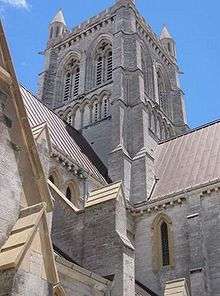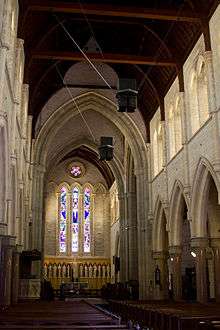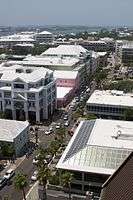Cathedral of the Most Holy Trinity, Bermuda
The Cathedral of the Most Holy Trinity (often referred to as the Bermuda Cathedral) is an Anglican cathedral located on Church Street in Hamilton, in the British Overseas Territory of Bermuda.

The original building was designed in the Early English style by James Cranston of Oxford in 1844 and was completed in 1869. Named Trinity Church, it was designated a chapel of ease as St. John's Church was already the parish church for Pemboke Parish. That building was destroyed by arson in 1884. Scottish architect William Hay, who had been consulted on the construction of the first building in 1848-1849 and again in 1862, was hired to design the current structure in 1885 in the Gothic Revival style. While Hay designed most of the structure, his partner George Henderson designed the eastern portion of the cathedral. Built between 1886–1905, to serve the state church (the Church of England; since 1978, the Anglican Church of Bermuda, an extra-provincial diocese under the Archbishop of Canterbury), the structure was primarily built from Bermuda limestone with the exception of several decorative features made from carved Caen stone that were brought in from France.[1]
It is one of two cathedrals in Bermuda, the other being the Roman Catholic St. Theresa's, also in Hamilton. Composer S. Drummond Wolff was organist at the cathedral from 1959–1962. For a small fee, visitors to the cathedral can climb the tower for a view of Hamilton and its harbour.
Gallery
 Interior
Interior View from tower
View from tower
